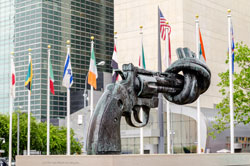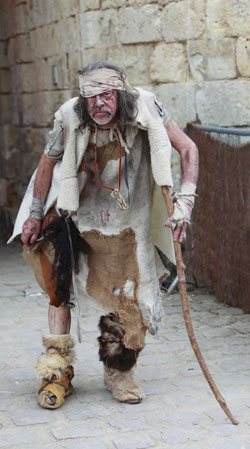Contributed by David Delaney, Salem, VA
Warm-up Question
Has anyone in your group ever spent time in a very poor area, either as part of your own living experience, or on a mission or immersion trip to a developing country, or heard stories from those who have been to such places?
your own living experience, or on a mission or immersion trip to a developing country, or heard stories from those who have been to such places?
- What are some of the words that come to mind when you imagine or recall the lives of those who live day-to-day, hand-to-mouth, or under threat of disease, war, or oppression? “Miserable,” “unfortunate,” “desperate,” “bitter,” “victim,” and “hopeless” are all words that might come to the minds of many. Some people might include words that reflect stereotypes of the poor as mostly responsible for their own condition or dismiss poverty with a resigned shrug – “that’s the way the world is.”
- What would you do if you lost everything? What would happen if your family disappeared, you had no income and no place to live, and you were left to blame for it all? That might sound like an extreme scenario, but try to imagine it. What words would you use to describe yourself then?
Whatever you might say, it is hard to imagine using the word “blessed” to describe someone else or yourself in a situation of poverty or any other kind of severe stress; that must be kept in mind as we reflect on Matthew 5.
Blessed to Bless
Many people use the term “blessed” to refer to some extra experience they have had for which they want to express some gratitude, even if they are not Christian or religious at all. In mid-January, Sandra Bullock described herself as feeling “overwhelmingly blessed” after receiving an Oscar nomination for her movie Gravity. Also in mid-January, the manager of the Liverpool soccer team praised one of his players, Daniel Sturridge, as being “genetically blessed” because of his remarkable ability to recover from injuries much faster than normal.
Discussion Questions
- Are these good uses of the word “blessed”? When you read Matthew 5, does it sound like Jesus is describing exceptional situations for exceptional people or the ongoing lives of everyday people?
- Are there ways for us to start seeing the constant experiences of our daily lives as blessings?
Scripture Texts (NRSV) for Sunday, February 2, 2014 (Fourth Sunday after Epiphany)
(Text links are to Oremus Bible Browser. Oremus Bible Browser is not affiliated with or supported by the Evangelical Lutheran Church in America. You can find the calendar of readings for Year C at Lectionary Readings.)
For lectionary humor and insight, check the weekly comic Agnus Day.
Gospel Reflection
The setting for the many things that Jesus taught throughout the gospels varies greatly, but the physical size of the land where he conducted his ministry was very small – less than the size of the state of Vermont. Most places could be reached by walking in less than a day, and even a trip from Capernaum to Jerusalem could be done in a little more than three days of brisk walking. Because there was a lot of travel done for business, government, and military purposes, people could easily see the great difference between the wealthier areas of the country and the poorer ones. They were often very close together. Jesus’ hometown of Nazareth was one of the poorest agricultural areas of the county, yet a brief walk to the top of the hill just south of his town would allow someone to see into the Jezreel Valley, one of the agriculturally richest areas of the country.
The traditional site of The Sermon on the Mount (Matthew chapters 5-7), from which this passage comes, is less than a day’s walk from Nazareth and is once again a very rich area. So when Jesus talks about being blessed, people from all different walks of life and economic circumstances might have been listening to him. Regardless of all of those differences, we read these verses knowing that everything – even life itself – is a gift from God. How do you hear that from the standpoint of your own particular setting in life?
Discussion Questions
- In verse one, Jesus goes up on a mountain to teach and invite his followers to a new kind of “law” for life. Who does this remind us of from the Old Testament (answer = Moses)? Do you think Matthew wants us to think of Jesus as replacing Moses or building on what the Israelite law said? (Look at Matthew chapters 22-23 to see examples of Jesus responding to questions about Israel’s law).
- If you list all of the various situations listed by Jesus in this set of verses, which ones sound like they are the result of something that has happened to someone (answers: poor in spirit, mourning, meek, experiencing persecution, being lied about), and which sound like qualities that someone might want to adopt or nurture (answers: righteousness, mercy, purity of heart, peacemaking)? Do they all have something in common? (Possibly, all are situations in which the presence of God is needed and one might not recognize the need for God’s presence without them, which is why they are a source of blessing). What do we learn about following Jesus from this? Is the blessed life an active and willful life, or passive and receptive, or both?
- These verses in Matthew are traditionally referred to as the “Beatitudes” (pronounced be-AT-i-tudes), from the Latin word “beo” which means to bless or make happy. There is a story about a child in Sunday School who had never seen or heard the word before and pronounced it “BEAT-i-tudes” and immediately added how much sense that made because these are RULES that BEAT you. It is easy to see how these sentences that are intended to be comforting could be turned around to become a checklist of things you have to do in order to earn blessings. How can we avoid thinking about them like that?
- How do we imagine that these blessings become real in the lives of people who experience the hardships Jesus describes? Is it simply a direct line from God to the individual? Or does the community have a role? Do we who have experienced these things before or who are already equipped with the good news of the gospel and the means to relieve suffering serve on God’s behalf in bringing blessing to others?
Activity Suggestion
- On a sheet of paper that you will fold up and carry with you this week as a reminder, list the names of actual people you know to whom you can relate in a new way according to this list of promises from Jesus. Is there someone in your life for whom you only have contempt or conflict? How can you be “poor in spirit” in your conversations with them? Do you know someone who is consumed by a lifestyle of destructive behavior or shallow thrill? Can your “hunger and thirst for righteousness” provide a suggestion of another way to live? Is there someone in your life who needs mercy and forgiveness from you or others? Can you show mercy and forgiveness to that person, knowing that it may not be received or returned? Are you afraid of the consequences of representing the love of God in Christ Jesus to others in word and/or deed? Recall that the promise of verses 11 and 12 are not just that you have a heavenly consolation for your courage and trouble, but that there may be others nearby who have desperately needed to hear and see the witness of someone who believes that God’s grace can really make a difference. Who in your life could benefit from that witness? Let this list of people be your personal prayer list for the week and also your reminder that God’s promises for following Christ as described here in Matthew 5 are true!
Closing Prayer
Lord Jesus, giver of every blessing, we rejoice that the wisdom and promises you first shared with your disciples have come down to us and still remain true today. Help us to come to you as your followers did in those days and to welcome your word with gladness, even as it calls us to repentance and service. We lift before you for your blessings all those whose spirits call out for relief and righteousness, all who mourn the loss of loved ones, who feel disenfranchised and isolated, and whose fondest desire is that they could feel strong enough to show mercy and forgiveness in the face of persecution and hatred. Give us along with all your people joy and gladness for the reward that is ours in your kingdom.




